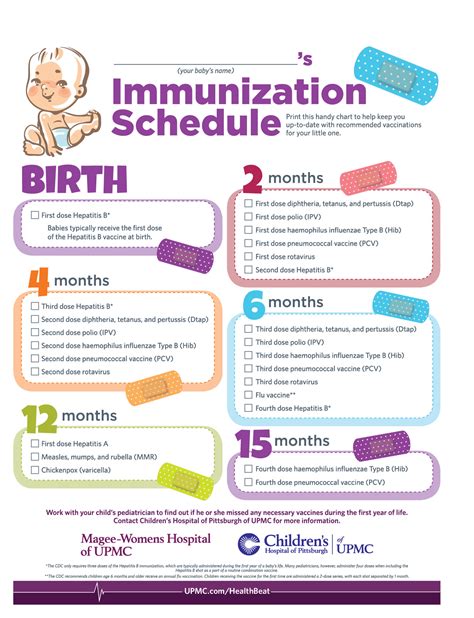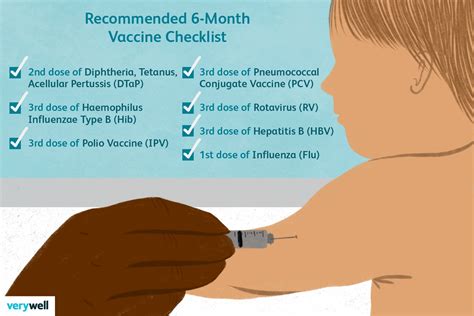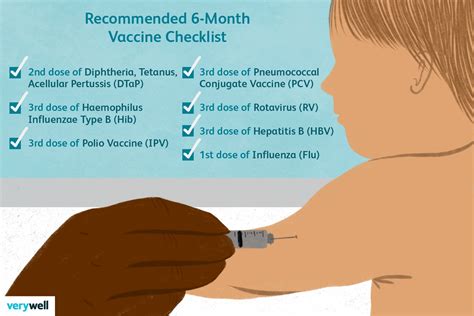Intro
The 6th month of a baby's life is a critical period of growth and development, and one of the most important milestones during this time is the 6th month vaccination. As a parent, it's natural to have questions and concerns about the vaccination process, and what to expect. In this article, we'll delve into the world of 6th month vaccinations, exploring the importance of this milestone, the benefits, and the potential risks.
As your baby grows and develops, their immune system is constantly evolving, and vaccinations play a crucial role in protecting them from serious diseases. The 6th month vaccination is a crucial milestone in the vaccination schedule, as it provides protection against a range of diseases, including diphtheria, tetanus, and pertussis (DTaP), Haemophilus influenzae type b (Hib), and polio. These diseases can have serious consequences, including respiratory failure, brain damage, and even death.
The 6th month vaccination is also an opportunity for parents to discuss their baby's health and development with their pediatrician. During this visit, the pediatrician will assess the baby's overall health, check for any signs of illness or infection, and provide guidance on feeding, sleep, and other aspects of baby care. This visit is an essential part of the vaccination process, as it allows parents to ask questions, address concerns, and receive personalized advice on caring for their baby.
Understanding the 6th Month Vaccination

The 6th month vaccination is a combination vaccine that protects against multiple diseases. The specific vaccines included in the 6th month vaccination schedule may vary depending on the country and region, but common vaccines include DTaP, Hib, and polio. These vaccines are administered in a series of injections, usually given in the thigh or arm, and are designed to stimulate the baby's immune system to produce antibodies against the diseases.
Benefits of the 6th Month Vaccination
The benefits of the 6th month vaccination are numerous, and include: * Protection against serious diseases, including diphtheria, tetanus, and pertussis (DTaP), Haemophilus influenzae type b (Hib), and polio * Reduced risk of hospitalization and death from vaccine-preventable diseases * Protection against long-term health consequences, such as brain damage and respiratory failure * Boosting of the baby's immune system, helping to prevent future illnessesPreparation for the 6th Month Vaccination

As the 6th month vaccination approaches, parents can take steps to prepare their baby for the visit. This includes:
- Ensuring the baby is well-rested and fed before the visit
- Bringing any relevant medical records or documentation
- Writing down questions and concerns to discuss with the pediatrician
- Bringing a comfort item, such as a pacifier or toy, to help soothe the baby during the vaccination process
Risks and Side Effects
While the 6th month vaccination is generally safe and well-tolerated, there are potential risks and side effects to be aware of. These may include: * Redness, swelling, or pain at the injection site * Fever, fussiness, or irritability * Allergic reactions, such as hives or itching * Rare but serious side effects, such as seizures or allergic reactionsAfter the 6th Month Vaccination

After the 6th month vaccination, parents can expect their baby to experience some side effects, such as redness or swelling at the injection site. In most cases, these side effects are mild and resolve on their own within a few days. However, if parents notice any unusual or severe side effects, they should contact their pediatrician immediately.
Caring for Your Baby After the Vaccination
To care for your baby after the 6th month vaccination, follow these tips: * Monitor the baby's temperature and watch for signs of fever * Use a cool compress or acetaminophen to reduce fever and discomfort * Offer plenty of fluids and breast milk or formula to help soothe the baby * Provide a comfortable and quiet environment to help the baby rest and recoverCommon Questions and Concerns

As parents navigate the 6th month vaccination process, they may have questions and concerns. Some common questions and concerns include:
- What are the risks and side effects of the 6th month vaccination?
- How can I prepare my baby for the vaccination?
- What are the benefits of the 6th month vaccination?
- Can I delay or skip the 6th month vaccination?
Addressing Concerns and Fears
It's natural for parents to have concerns and fears about the 6th month vaccination. However, by understanding the benefits and risks, and by discussing concerns with their pediatrician, parents can make informed decisions about their baby's health. Some tips for addressing concerns and fears include: * Writing down questions and concerns to discuss with the pediatrician * Bringing a support person, such as a partner or family member, to the vaccination visit * Asking about the vaccination process and what to expect * Seeking out reputable sources of information, such as the Centers for Disease Control and Prevention (CDC) or the World Health Organization (WHO)Conclusion and Next Steps

As parents navigate the 6th month vaccination process, it's essential to remember that this milestone is just one part of a larger journey. By understanding the benefits and risks, and by staying informed and engaged, parents can make the best decisions for their baby's health. Some next steps to consider include:
- Scheduling follow-up visits with the pediatrician to monitor the baby's health and development
- Staying up-to-date on recommended vaccinations and schedules
- Seeking out reputable sources of information and support
- Connecting with other parents and caregivers to share experiences and advice
What is the 6th month vaccination, and why is it important?
+The 6th month vaccination is a combination vaccine that protects against multiple diseases, including diphtheria, tetanus, and pertussis (DTaP), Haemophilus influenzae type b (Hib), and polio. It's an essential milestone in the vaccination schedule, as it provides protection against serious diseases and helps to boost the baby's immune system.
What are the potential risks and side effects of the 6th month vaccination?
+While the 6th month vaccination is generally safe and well-tolerated, there are potential risks and side effects to be aware of, including redness, swelling, or pain at the injection site, fever, fussiness, or irritability, and allergic reactions. Rare but serious side effects can also occur, such as seizures or allergic reactions.
How can I prepare my baby for the 6th month vaccination?
+To prepare your baby for the 6th month vaccination, ensure they are well-rested and fed before the visit, bring any relevant medical records or documentation, write down questions and concerns to discuss with the pediatrician, and bring a comfort item, such as a pacifier or toy, to help soothe the baby during the vaccination process.
We hope this article has provided you with a comprehensive understanding of the 6th month vaccination, its benefits, and its potential risks. If you have any further questions or concerns, please don't hesitate to reach out to your pediatrician or a qualified healthcare professional. Share your experiences and thoughts on the 6th month vaccination in the comments below, and help other parents navigate this important milestone.
